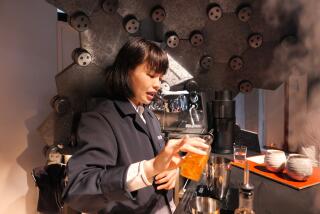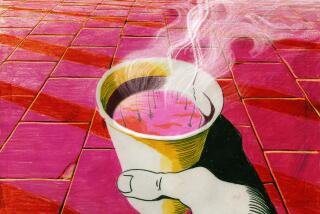Nestle Single-Cup Coffee Maker Success Brews Rivalry
- Share via
With 21 coffee makers to choose from at the Williams- Sonoma store in Princeton, N.J., Jerry Bagel zeroed in on two Nespresso machines as he contemplated a going-away gift for his son, Rick, who is about to start college.
Bagel, a 50-year-old dermatologist, already has a Nespresso maker at his office in nearby West Windsor.
Since the black-and-chrome machine marketed by Nestle uses prepackaged capsules of ground coffee, he has time to brew cups of espresso between patients.
“It’s the only toy I have in my office,” Bagel said. “It’s simple, it doesn’t make any mess and takes just 15 seconds to make.”
Nestle, whose Nescafe instant coffee makes it the world’s largest coffee seller, began marketing Nespresso 15 years ago to attract customers who were turning to coffee shops like those of Starbucks Corp.
Now, competitors such as Kraft Foods Inc. and Procter & Gamble Co. are piling into the market for single-serving coffee after Nespresso sales rose 29% last year, at a time when ground coffee consumption in U.S. and European homes stagnated.
U.S. retail sales of ground coffee fell 15% to $2.9 billion from 1998 to 2003, and are forecast to drop an additional 17% by 2008, according to London-based market research firm Mintel International Group.
In Germany, Europe’s largest market, sales fell 44% to $2.6 billion in the same period.
“The big food players are seeing their in-home share of the coffee market growing slower than the out-of-home sector,” said David Jago, Mintel’s editorial director. “This is a way of fighting back.”
Starbucks, the biggest U.S. coffee shop chain, added 1,201 stores in the year through September, helping boost sales by 24% to $4.1 billion.
At Nestle, instant-coffee sales fell 2.9% to $6.41 billion in 2003, after dropping 7.3% the previous year. Vevey, Switzerland-based Nestle, which gets about 10% of its revenue from instant coffee, attributes the decline mostly to the weaker dollar.
By contrast, Nespresso sales rose 29% to 450 million francs ($359 million) last year.
Kraft, the largest U.S. food maker, began test-marketing its Tassimo brand coffee “discs” and a brewing machine made by Braun at the end of June.
Procter & Gamble, the biggest U.S. household goods maker, started selling its HomeCafe system in May. Sara Lee Corp., the world’s third-largest coffee roaster, began selling its Senseo brand in Europe three years ago. Senseo sales more than doubled in fiscal 2004 to $234 million from $110 million last year.
The products fall into two categories. Nespresso and Tassimo coffee is packed in metal capsules that won’t fit any other machine. The others use filter-paper “pods.” The Senseo and HomeCafe machines are designed primarily for their own pods.
“New competitors have to be taken seriously, but they also present an opportunity for the overall market to grow faster,” said Nespresso director Marc-Alain Dubois. “We are very optimistic because our product and our strategy are right.”
Nespresso has sought to differentiate itself as a gourmet product, selling machines and coffee through a network of 25 boutiques that display gleaming espresso makers and rows of red, blue and gold capsules in cities from Moscow to New York.
The Nespresso machines, the most expensive of which can be custom-fitted to home kitchens, range from $245 to $2,200.
More to Read
Inside the business of entertainment
The Wide Shot brings you news, analysis and insights on everything from streaming wars to production — and what it all means for the future.
You may occasionally receive promotional content from the Los Angeles Times.










